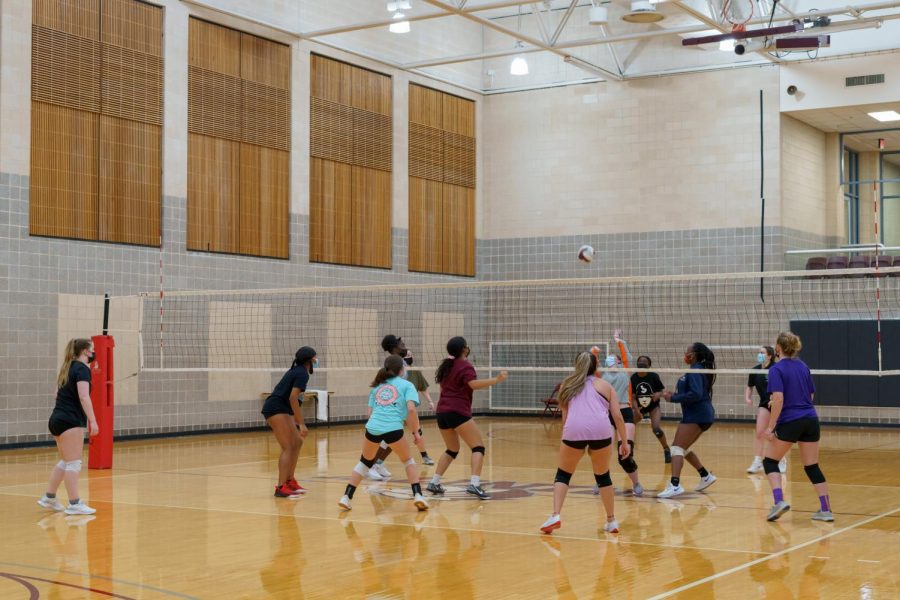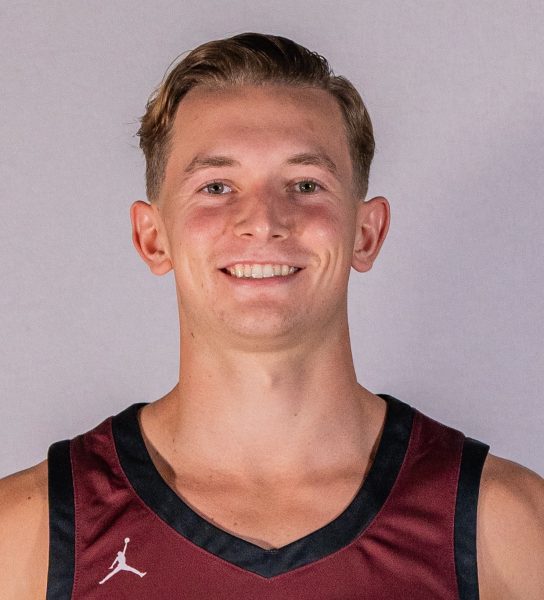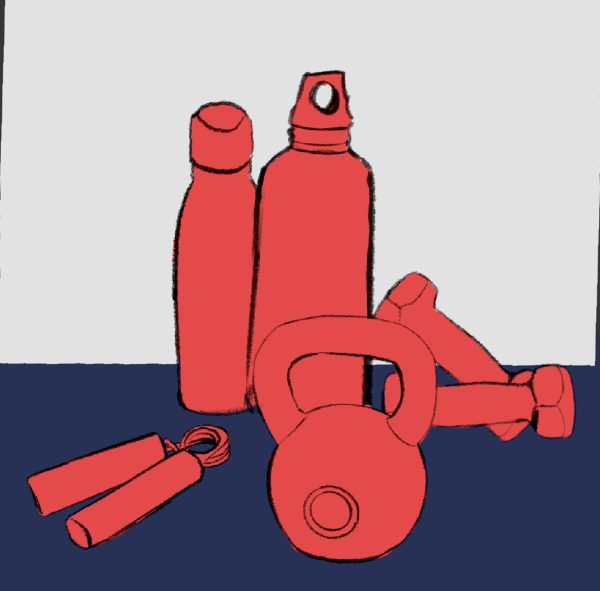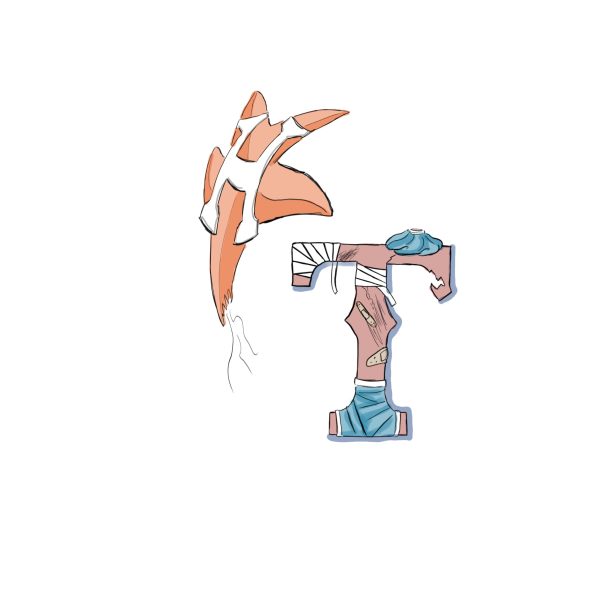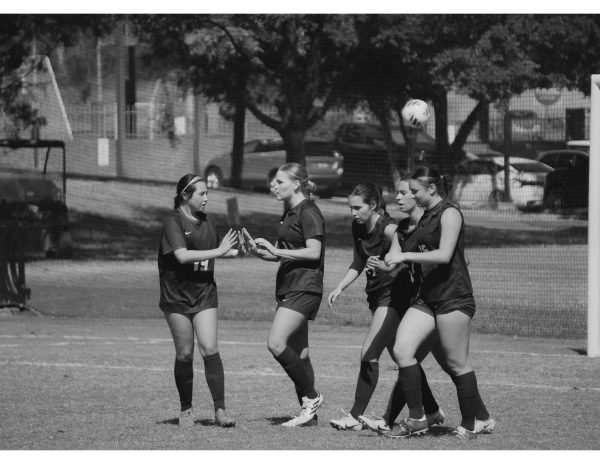Come On In!
Trinity’s Indoor Club Sports return as restrictions start to shrink.
Following March 2020, the courts were silent, the lights off. The tables were folded, chairs stacked, the building empty. No whistles echoed through the rooms, no shoes were squeaking, no foils clashing, no balls rolling. Students who had relied on club sports for indoor stress release were helpless to do anything. That is, until this year.
Club sports, a vital part of campus life, suffered greatly during the pandemic-induced lockdowns. While Trinity cleared outdoor activities for action at the start of the year, indoor clubs have been limited due to social distancing and capacity restrictions. However, with Trinity easing their restrictions throughout the semester, indoor sports have returned after almost three semesters. For the first time in a long time, indoor club sports such as ping pong, fencing and volleyball have returned to the Bell Center to practice, marking a slight return to normal, to the joy of many.
However, the road wasn’t always smooth, and the risk of a second canceled season was extremely high. With the Delta variant rising over the summer, there was doubt not just for sports but also for academics, which posed a concern for club sports according to senior Rebecca Wicker, the captain of the women’s volleyball club.
“I was nervous about not only sports but also in-person learning,” Wicker said. “In-person learning has a huge effect on whether or not people show up for extracurricular activities. If you’ve been sitting on a computer for eight hours a day, you don’t want to get up to do a two-hour volleyball practice. I was concerned whether there was going to be enough morale in the student body by the start of the season.”
Another issue with the imposed restrictions was simply waiting, as pointed out by men’s club volleyball captain Imran Khan.
“We’re all super passionate about playing. That’s what’s so great about the group we have now. Not being able to play when we think we should have opportunities has definitely been hard, as well as trying to stay in playing shape,” Khan said.
Even with the risks of the variants, however, some captains knew it was only a matter of time until the sports opened up. Ping pong club president Sena Saygili explained that, in spite of the plethora of variables the club has faced during its first official year, COVID did not deter them from starting.
“There was never going to be a ‘perfect’ time to start, especially since we see that COVID will be around for a while,” Saygili said. “We had to wait until we had approval for indoor practices, as well as wanting to make sure we were abiding [by] COVID policies as best we could. I also wanted to make sure we were following rules and regulations belonging to club sports since this is our first year as one.”
Fencing club president Matthew Menezes was confident that the season would go on but maintained a plan of caution.
“We didn’t have doubts about the season, per se, but we did have to have contingency plans just in case,” Menezes said. “We had to track who used what equipment, who everyone faced in bouts and whatnot. We’ve not had the worries that we’ve had to cancel the season, but we’ve had to have precautionary measures.”
Now, I’m sure that we it’s easy for us all to remember back to last year. Most classes were online, lockdowns were present everywhere and the risk of infection was high. Restrictions hit the club hard, to the point where even getting people together for practices was challenging, according to Khan.
“I felt like it was owed to us as students,” Khan said when talking about his fight to organize practices last year. “I didn’t think it was fair to see varsity volleyball practicing the whole time while COVID was a thing, while we weren’t able to. I feel that the whole point of club sports is to provide an enriching experience for students.”
The struggle to practice was shared by the women’s club volleyball team as well, according to Wicker.
“It was honestly incredibly difficult, particularly last semester because the only option we had was to play out on the sand volleyball courts. After not being able to play for a year, it’s very difficult to get people to return to the group,” Wicker said.
Although indoor sports have been cleared, clubs must proceed with caution and mind safety restrictions, according to Menezes.
“We were able to do everything that we wanted,” Menezes said. “However, we’ve had to divide our members a lot more [due to distancing restrictions]. Sanitizing our equipment is a big thing, as well as masks.”
The distancing restrictions affected clubs with smaller areas of play, according to Saygili.
“Last semester, not only was it difficult to recruit, but it was tough to even get a few people in the same room together. This semester has already been a much bigger improvement in that we’re able to have practices, tournaments and meets indoors. We’re all fully masked and try to keep social distancing in mind still, as much as possible. It’s been a while since we’ve had big events like these, so the first event was definitely tough.” Saygili said.
Saygili credits the reopening of indoor club sports to the efforts of Trinity University to contain the virus, which was far from an easy feat.
“A combination of factors like Trinity’s high vaccination rate, their efforts in keeping us safe and, of course, everyone’s arrival on campus definitely gave us the green light to go ahead,” Saygili said.
However, not everyone is happy with the pace of the reopenings. Khan expressed frustration at travel restrictions that have prevented the men’s volleyball club from competing, even as outdoor club sports have been able to travel for competition.
“We were scheduled for a tournament on [Oct. 30], and we’re still not able to go,” Khan said. “We’re one of two universities in our conference that’s not allowing travel to play tournaments indoors, despite having the highest vaccination rate and the least number of cases [as of Oct. 4].”
Khan’s frustration largely stems from feeling that indoor sports have been deprioritized in favor of other athletic groups.
“These guys have lost a year or more of their potential play-time, and they’re not going to get it back. When other students have opportunities that we are not provided simply because it’s not a priority, it just feels unfair. We’re all students,” Khan said.
Not being able to influence the decisions, even as a captain, was a struggle shared by Wicker.
“As a captain, I have to be everyone’s first source of information. There are just so many different levels that you have to go through, and the hardest part was telling people, ‘I don’t know,’ because people don’t like hearing that,” Wicker said. “As a captain, you’re supposed to know everything and have all the information. As a student, there’s honestly very little I can do to influence the people ‘upstairs’ in administration.”
As the semester goes on, more and more events will be cleared are looking to open, which will hopefully provide a fantastic experience for both upperclassmen and the upcoming students.
“Luckily, over the summer, we got a ton of interest,” Wicker said. “When we went to the student involvement fair, we got a ton of interest. There’s a lot of hope that this year will be more normal. We got a lot of interest from first-years and sophomores, which is just fantastic. I’m really looking forward to the Alamo Colleges tournament in the spring semester. Trinity has a strong history of winning and being successful, and I’m looking forward to being successful.”
Competition is a shared goal for both volleyball club captains. Khan is especially ready to return to the court this semester.
“I’m very much looking forward to competing in my last year as a student,” Khan said. “Competing in tournaments against other teams is something that I’ve missed since my sophomore year.”
Fencing also will enjoy a return to regular events, according to Menezes.
“We’ve still got to be precautious, but the biggest things I’m looking forward to are the big club collaboration events,” Menezes said. “We’ve got an event coming up with the Japanese Culture Club, and we’re doing this Kendo [Japanese sword fighting] demonstration.”
On top of the physical exercise and competition, the social aspect of club sports is something that Saygili is excited about.
“I’m really looking forward to bringing people together, which is something I’ve always loved doing,” Saygili said. “This club gave me the opportunity to do that, and so far it has been such a pleasure being able to come together to play a common game.”

Hey! My name is Caleb Reed, and this will be my second year as the sports editor! Unfortunately, I'm a senior, so this will be my final year, but I've...

My name is Sam (he/him) and I'm a photographer here with the Trinitonian. I'm a senior Communications and German double major from Austin, Texas, and...

